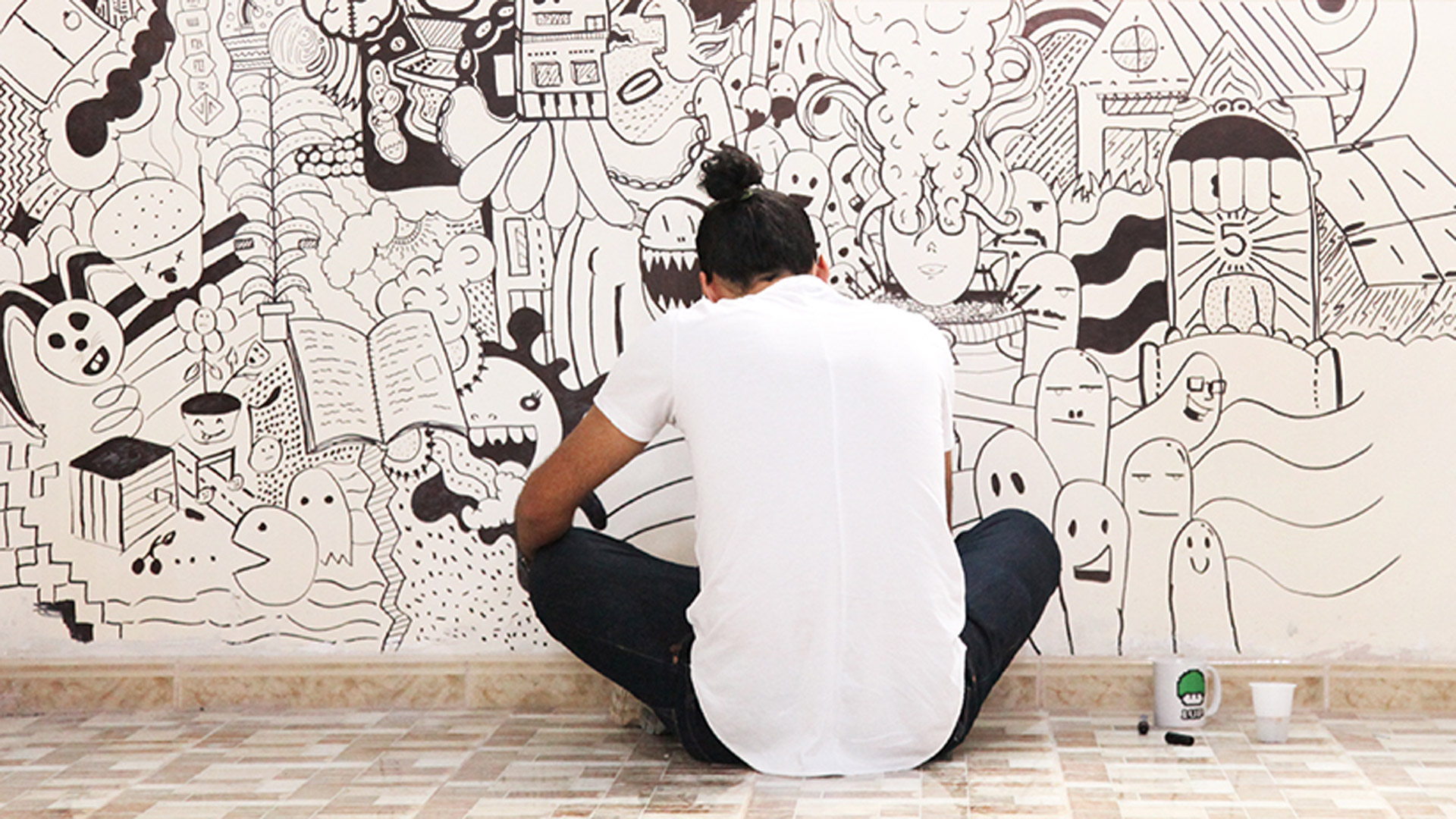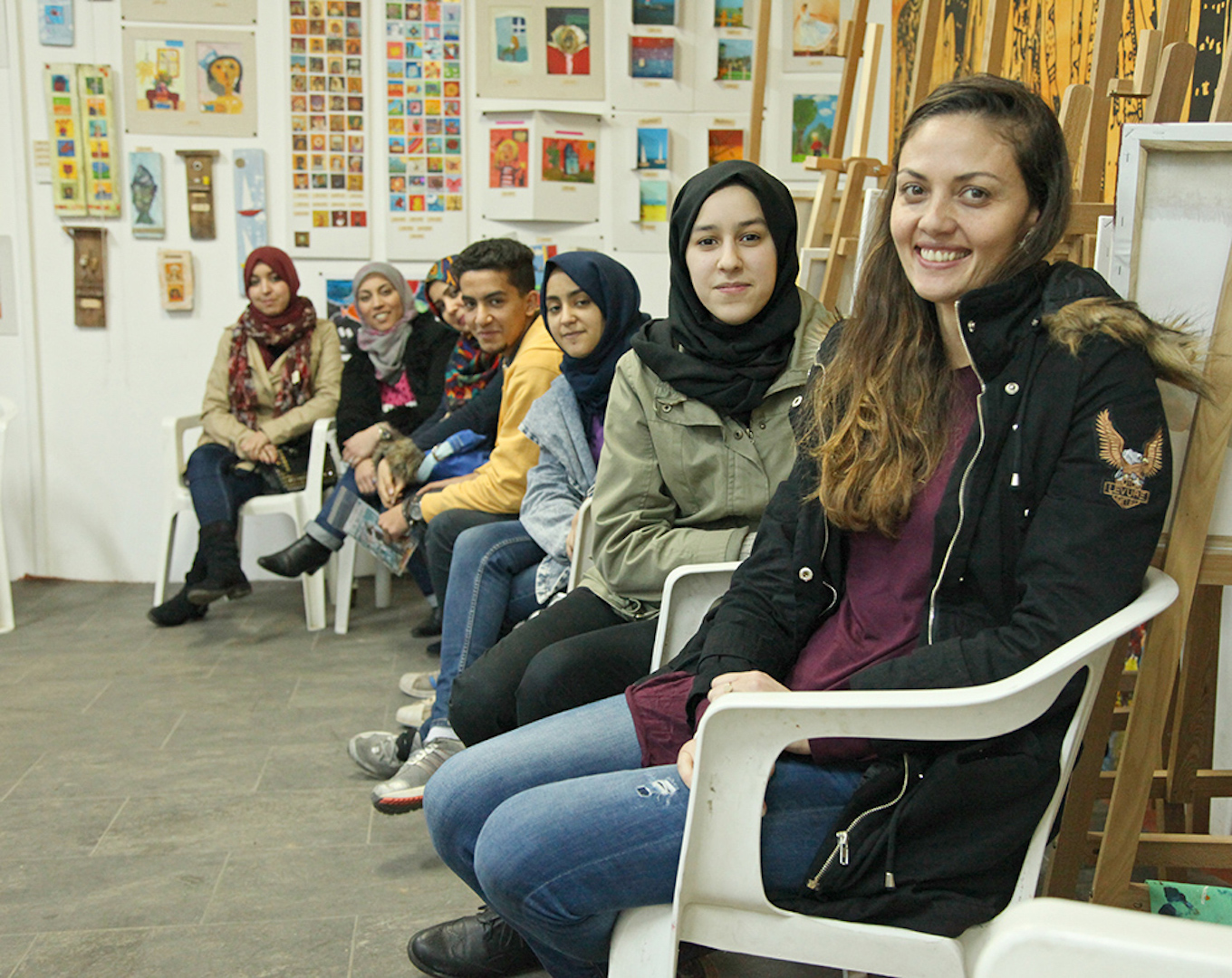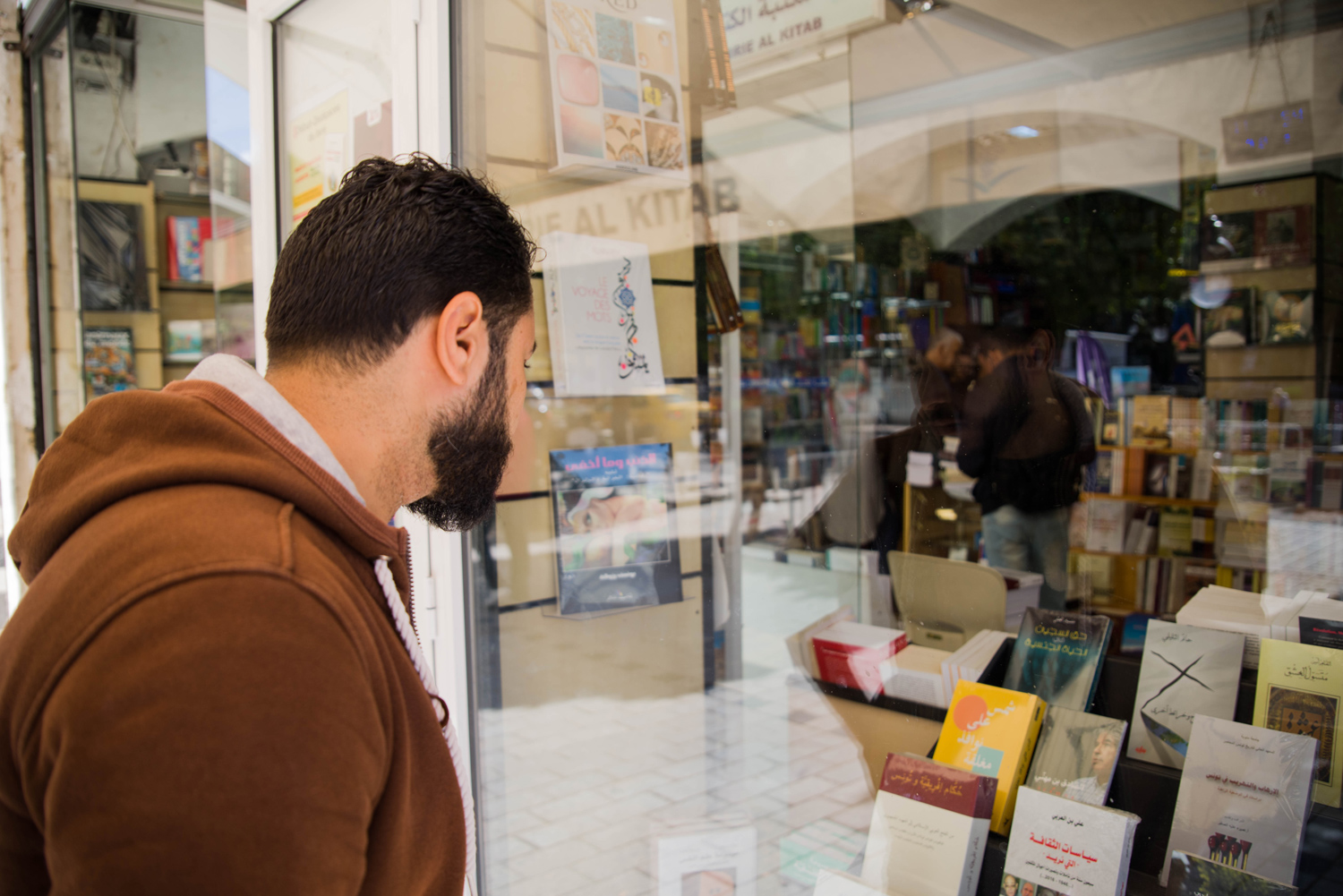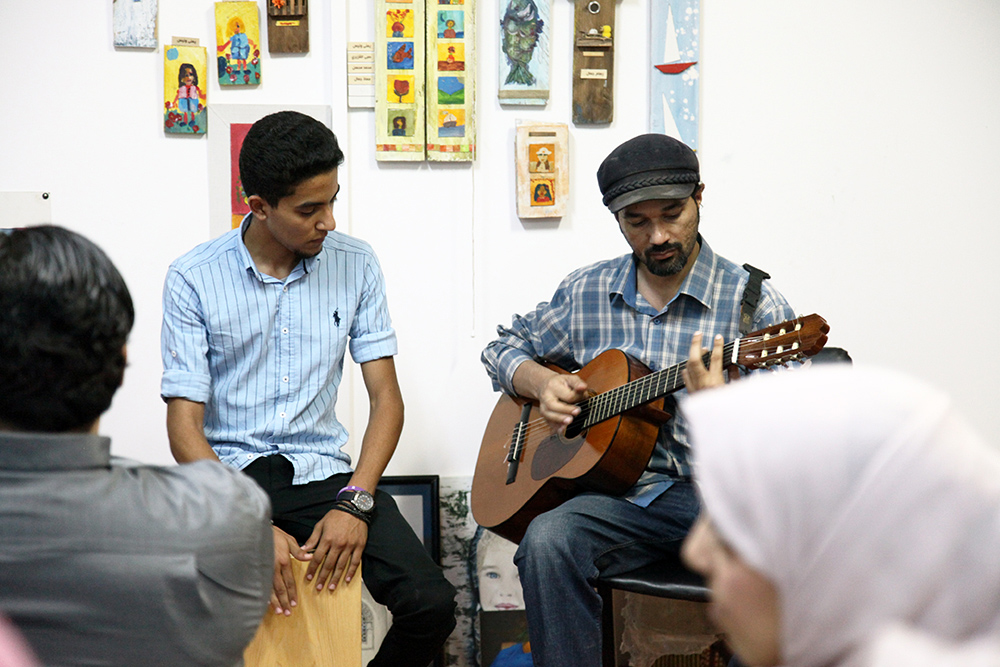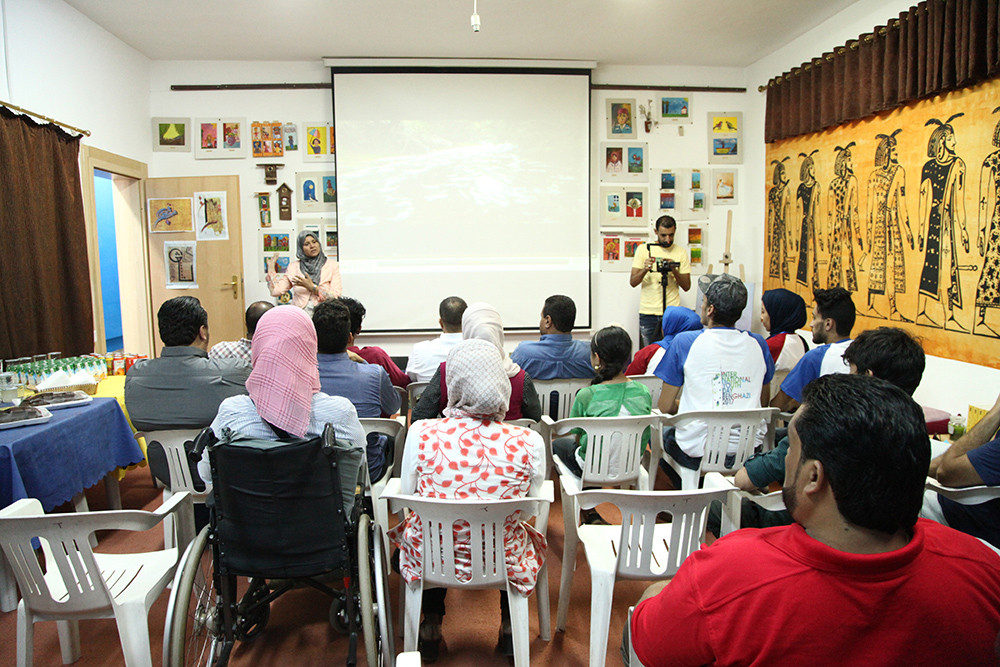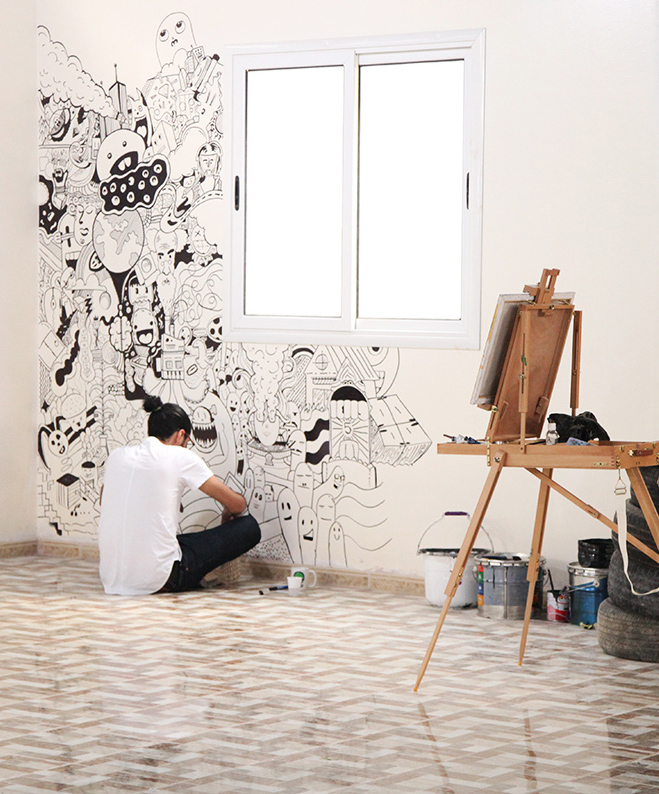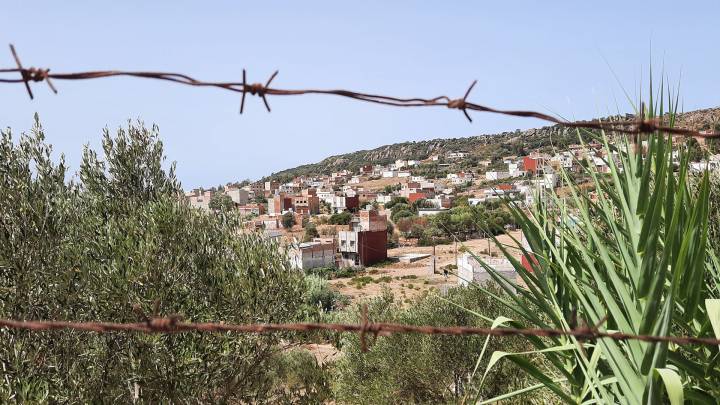In conservative Benghazi the cultural space Tanarout has become a haven from the war, a space where boys and girls can escape growing extremism and the rampant unemployment induced by the ongoing conflict.
Gunfire was all Mohamed Al Trhoni could hear when the war for Benghazi arrived at his doorstep. His neighbourhood was trapped between strongman Khalifa Haftar’s Libyan National Army (LNA), which Trhoni supports, and a loose alliance of Islamist militias. Frightened for his sons, he quickly packed his belongings and hurried his family into the car. On 27 October 2015, they fled to Abyar, a small city 50km east of Benghazi.
“Our house was destroyed after we left,” says Trhoni with resignation. “I was devastated. But at least Abyar was quiet, allowing me to think about how I could help the people of Benghazi.”
Six weeks later, Trhoni returned to his beloved city alone. In the mornings that followed, he met close friend Hosam Athani in a street café where cliques of artists frequently gather. Drinking their espressos in a fog of second-hand smoke, the two discussed the city’s conservative norms and growing extremism.
By then, universities had been closed and unemployment was rampant, pushing young men into militias and gangs. Some were lured by a stable salary, while others were brainwashed into fighting in a religious war. More families also started fearing that their wives and daughters could be harassed or raped if they left home.
The friends I made in Tanarout will be my friends for life.
Benghazi, thought Trhoni, needed a safe place where young people could express themselves through art and culture. The idea enthralled Athani, who was equally committed to protecting the city’s youth from the conflict. But their plan was impossible unless they rented a studio, which neither could afford. Desperate for a place, Athani called a man he knew who owned property in the conservative Al-Berka district.
“This man had lent my friend a room some time before, so that we could teach calligraphy,” says Athani. “I was hoping I could borrow it again until I could afford to pay rent.”
After speaking to Athani, the landlord handed him the keys, free of charge for a year. In December, Athani and Trhoni opened the cultural club Tanarout – the Amazigh word for a valley in the Libyan Sahara. The Amazigh – a language and people indigenous to North Africa – were marginalised during Muammar Gaddafi’s rule. Acknowledging the oppression, the centre took the name to celebrate Libya’s diverse history and culture.
“Water is left behind after each winter in the Tanarout valley,” explains Trhoni. “And like the water in the Sahara, Benghazi needs [art and culture] to breathe.”
Like family
Tanarout became a haven from the war, featuring classes in music and photography and a weekly cinema club. Paintings and drawings hung on every wall, creating an ambience that attracted young people.
In March 2016, Faraj Elsilieni became an official Tanarout member after paying a student fee of 10 Libyan dinars (USD 2) a month. By then he was learning calligraphy and would become engrossed in the books at the centre, visiting every day unless the main road was closed due to violent clashes.
I see hope in the eyes of the youth who found Tanarout. “The friends I made in Tanarout will be my friends for life,” Elsilieni tells zenith. “[Athani and Trhoni] have become like big brothers to us. They say they will talk to our parents about why Tanarout is important if they ever have doubts.”
While Elsilieni’s parents have no qualms about the centre, his father worries about the growing intolerance towards art and culture in Benghazi. Some neighbours called Elsilieni a traitor for travelling to Germany with the Goethe-Institut last year. Others now harass him for going to Tanarout.
Despite the jeering, his mother encourages him to study at the centre after school, and on a few occasions she has disclosed her fascination with music, literature and cinema. She only wishes, says Elsileni, that Tanarout had been established when she was young.
Now that it does exist, young women like Shefa Salem are taking advantage. In May 2016, the 21-year-old started going to the centre to learn painting techniques. She invited friends along, but some parents didn’t let their daughters come.
“Some families thought it was safer to keep their daughters indoors during the war [in Benghazi],” says Salem. “That made no sense to me. Bombs were as likely to fall on my house as they were on Tanarout.”
Trhoni and Athani keep encouraging women to come to the centre. Earlier this year, their friend Dina Gallal organised two photography workshops, each attracting more women than men. She taught them how to take quality photos with their phones, since few had access to a camera.
Gallal’s work is displayed across an entire wall in Tanarout. Right now, she’s producing a series of black-and-white photos of her house, which was bombed and riddled with bullets. The project, she says, captures the price that everyone pays in war.
“I was always disappointed that Libya didn’t have more female photographers. I hope that some of them can see me as a role model.”
Hostile neighbours
As Tanarout grew more popular, Al-Berka became less tolerant. Many neighbours didn’t approve of a cultural centre that taught men and women in the same classes. They also complained that literature and music were corrupting Libya’s youth, steering them away from the pillars of Islam.
Some men, their identities still unknown to Tanarout, disrupted classes by cutting off the Internet, while Salafists incited hate campaigns over Facebook. Trhoni and Athani experienced constant anxiety, fearing that extremists might close the centre by force. And like the rest of civil society, they couldn’t count on the LNA for protection.
On 23 April 2017, Tanarout’s members attended an event to celebrate National Book Day. When they returned, they noticed that the locks on the doors were damaged. “Somebody was trying to break into the centre,” says Mohamed Busnein, a musician and programme planner for Tanarout. “Luckily for us, they didn’t have enough time.”
More trouble was to come. At the end of August, Tanarout and its members were threatened over social media for endorsing the Libyan literature anthology Sun on Closed Windows. Athani contributed several poems to the book, which was banned after sparking outrage across the country over a passage that an Islamist militia deemed “profane and obscene”.
“It was a cold war,” recalls Athani. “There were people in Al-Berka who were always against us, but they felt more emboldened after the scandal with the book.”
A few days later, a man harassed a woman entering Tanarout, compelling Elsilieni to intervene. Overhearing the confrontation, Athani ran outside to separate the two men. Elsilieni stepped away, but the man didn’t back off. Forced to restrain him, Athani grabbed him by the shirt and shoved him away. Then he became nervous, not knowing if the man belonged to a militia or gang.
“The guy pulled out his phone and started dialling numbers,” says Athani. “I stood by the entrance until he left, but I was afraid that he would return in the evening with his friends.”
When Athani called Trhoni to tell him what had happened, they agreed that they had to leave Al-Berka. The next day, they announced on Facebook that Tanarout was closed until they found a new place. It didn’t take long. By October, classes had resumed in a district called Al-Hadiqaq.
Despite their perseverance, challenges remain. Athani says the centre struggles financially, relying mostly on generous donations from abroad; and the LNA, which now controls Benghazi, doesn’t have a favourable stance towards civil society. Among its ranks are Salafists that Haftar co-opted, who have shut down cultural events and banned books deemed sacrilegious.
Al-Hadiqaq is nonetheless more tolerant than Al-Berka. And while members are still harassed and threatened online, they keep coming to the centre. Tanarout, says Trhoni, has become a family amid war.
“I see hope in the eyes of the youth who found Tanarout,” he tells me. “I know we have built a great place by looking at their smiles.”

